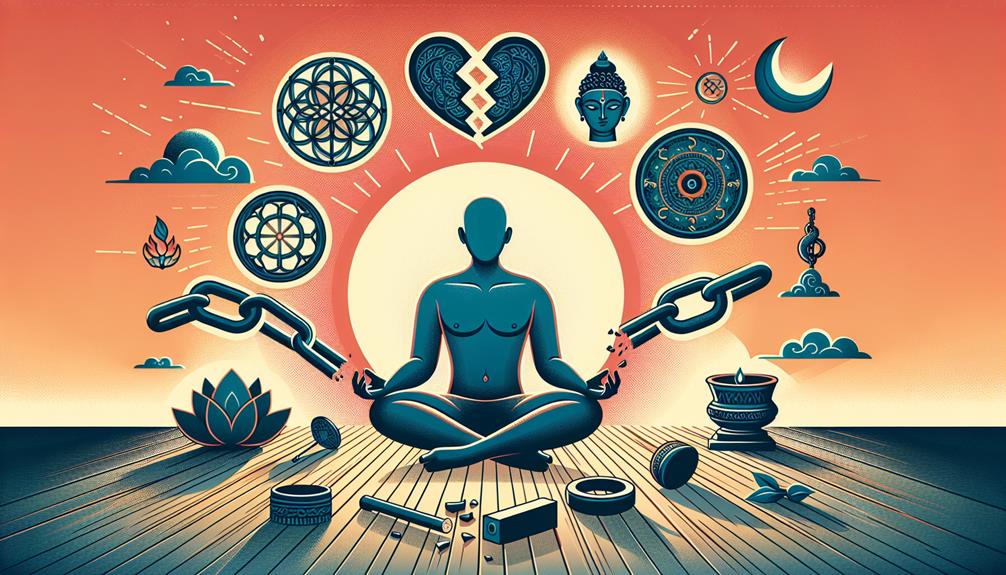What Is The Sin Kama In Hinduism
In Hinduism, the concept of Kama, often translated as desire or longing, carries a complex significance that extends beyond mere physical desires. It is intertwined with the idea of sin, leading to ethical dilemmas that challenge individuals on their spiritual journeys.
What Is The Sin Kama In Hinduism
Understanding how Kama operates as a source of sin sheds light on the intricate relationship between desire, morality, and personal growth.
What Is The Sin Kama In Hinduism
Exploring the role of Kama in Hindu philosophy unveils a profound exploration of human nature and the quest for spiritual enlightenment.
What Is The Sin Kama In Hinduism
Key Takeaways
- Kama is not inherently sinful but can lead to sin if desires are pursued unethically.
- Balancing Kama with Dharma is crucial to avoid negative karmic consequences.
- Ethical dilemmas arise when desires conflict with moral principles in Hinduism.
- Overcoming Kama involves cultivating detachment, mindfulness, and redirecting desires towards spiritual growth.
The Concept of Kama in Hinduism
Kama, an essential aspect of Hindu philosophy, embodies the concept of desire and pleasure within the framework of righteous living and spiritual fulfillment. It is one of the four goals of human life, known as the Purusharthas, alongside Dharma (duty), Artha (wealth), and Moksha (liberation).
What Is The Sin Kama In Hinduism
In Hinduism, Kama is not viewed as inherently sinful but rather as a natural and important part of human existence. It is seen as a driving force that motivates individuals to seek relationships, procreate, and find enjoyment in life.
What Is The Sin Kama In Hinduism
Within the concept of Kama, there is an emphasis on the pursuit of desires in a harmonious and ethical manner. This involves fulfilling one's desires in ways that do not harm others or conflict with one's duty (Dharma). By integrating Kama into a virtuous life guided by Dharma, individuals can experience pleasure and satisfaction while also progressing spiritually towards ultimate liberation (Moksha).
What Is The Sin Kama In Hinduism
In essence, Kama, when balanced with the other Purusharthas, plays a crucial role in leading a fulfilling and meaningful life in Hindu philosophy.
What Is The Sin Kama In Hinduism
Kama as a Source of Sin
While Hinduism traditionally views Kama as a fundamental aspect of human existence that can lead to spiritual growth when aligned with Dharma, there are perspectives within the tradition that highlight the potential for Kama to manifest as a source of sin. In Hindu philosophy, Kama refers to desires, including physical, emotional, and material desires.
When these desires are pursued in a manner that contradicts ethical or moral principles, they can lead individuals away from their spiritual path and result in sinful actions. For example, if one allows lust to overpower reason and engages in inappropriate relationships or actions, it can lead to negative karmic consequences and distance the individual from spiritual growth.
Similarly, excessive attachment to material possessions or wealth driven solely by desire can also lead to unethical behaviors and sinful outcomes. Therefore, while Kama itself is not inherently sinful, the way in which it is pursued and expressed can determine whether it becomes a source of sin in Hinduism.
Kama and Ethical Dilemmas
Exploring the ethical implications of desires and their impact on moral decision-making is crucial within the context of Hindu philosophy. In Hinduism, the concept of Kama presents individuals with various ethical dilemmas that test their commitment to righteous living. These dilemmas often arise from the conflict between fulfilling desires and adhering to moral principles. Here are three key points to consider when navigating the intersection of Kama and ethical decision-making:
- Dharma and Kama Balance: Finding a harmonious balance between fulfilling desires (Kama) and upholding one's duty and righteousness (Dharma) is essential in Hindu ethical teachings.
- Consequences of Unrestrained Desires: Allowing desires to dictate actions without ethical considerations can lead to negative consequences, such as harming oneself or others, and disrupting the natural order.
- Seeking Virtuous Desires: Emphasizing the importance of cultivating virtuous desires that align with one's spiritual growth and contribute positively to society can help individuals navigate ethical dilemmas related to Kama.
Overcoming Kama on the Spiritual Path
Navigating the spiritual journey in Hindu philosophy involves a profound exploration of transcending desires and overcoming the influence of Kama on one's path towards spiritual enlightenment. In Hinduism, Kama represents the desires and attachments that bind individuals to the cycle of birth and death, hindering spiritual progress. To overcome Kama on the spiritual path, practitioners strive to cultivate detachment, self-discipline, and inner strength. By practicing mindfulness, meditation, and self-reflection, individuals can develop a deeper awareness of their desires and learn to resist their temptations. Additionally, seeking the guidance of spiritual mentors and studying sacred texts can provide insights and tools for overcoming Kama.
On the spiritual path, the journey towards enlightenment requires a conscious effort to transcend worldly pleasures and attachments. By redirecting desires towards spiritual growth and self-realization, individuals can gradually diminish the hold of Kama on their consciousness. Through dedication, perseverance, and a sincere commitment to spiritual practices, one can overcome Kama and progress towards a state of inner peace, wisdom, and liberation.
Balancing Kama in Daily Life
Achieving a harmonious balance between desires and spiritual growth is essential for navigating daily life in Hindu philosophy. In Hinduism, the concept of balancing Kama, or desire, in daily life is crucial for individuals seeking spiritual advancement while still actively participating in the material world. Here are three key practices to help maintain this equilibrium:
- Self-awareness: Regular introspection and self-reflection can help individuals identify their desires and distinguish between those that align with their spiritual goals and those that may lead them astray.
- Moderation: Practicing moderation in all aspects of life, whether it be in consumption, relationships, or pursuing ambitions, can help prevent desires from becoming overwhelming or detrimental to spiritual progress.
- Service to Others: Engaging in selfless service and acts of kindness towards others not only cultivates a sense of community and belonging but also redirects focus from personal desires to the well-being of others, fostering spiritual growth in the process.
Frequently Asked Questions
Are There Any Specific Rituals or Prayers in Hinduism That Can Help Overcome the Influence of Kama?
In Hinduism, specific rituals and prayers can assist individuals in overcoming the influence of kama, the desire for sensual pleasure. Practices such as meditation, yoga, and devotional worship can help devotees cultivate self-control, discipline, and detachment from worldly desires.
How Does the Concept of Kama Differ in Hinduism Compared to Other Religions or Belief Systems?
In the rich tapestry of religious beliefs, the concept of kama in Hinduism stands out for its nuanced interpretation. Unlike other religions, where desire may be viewed as sinful, in Hinduism, kama is seen as a legitimate pursuit when balanced with other goals like dharma (duty) and moksha (liberation).
This unique perspective on desire sets Hinduism apart and offers a holistic approach to understanding human nature and fulfillment.
Can Kama Be Seen as a Positive Force in Some Contexts Within Hinduism?
In certain contexts within Hinduism, kama can indeed be viewed as a positive force. This concept of desire, when aligned with dharma (righteousness) and pursued in moderation, can lead to the fulfillment of one's duties and responsibilities.
Kama, in this light, serves as a driving force for individuals to engage in actions that contribute to their personal growth and the well-being of society. Balancing kama with other virtues is key to harnessing its positive potential.
Are There Any Historical or Mythological Figures in Hinduism Known for Their Ability to Resist the Temptations of Kama?
In Hinduism, numerous historical and mythological figures exemplify remarkable restraint and discipline in resisting the temptations of kama, the desire for sensual pleasure. These figures serve as inspiring examples of self-control and spiritual strength.
Through their stories, they demonstrate the ability to transcend worldly desires and focus on higher spiritual goals. Their narratives highlight the importance of mastering one's desires to achieve spiritual enlightenment and inner peace.
How Does the Concept of Kama Influence Gender Roles and Relationships in Hindu Society?
The concept of kama in Hindu society plays a significant role in shaping gender roles and relationships.
Kama, representing desire and pleasure, influences the dynamics between men and women, emphasizing the importance of love and physical intimacy within marital relationships.
It also guides individuals in understanding their desires and responsibilities towards their partners, fostering a sense of mutual respect and harmony within traditional Hindu family structures.
Conclusion
In conclusion, the concept of sin Kama in Hinduism highlights the powerful and often tempting nature of desire. It serves as a reminder of the ethical dilemmas that arise when one becomes consumed by worldly pleasures.
Overcoming Kama is essential on the spiritual path, requiring individuals to find a balance between fulfilling desires and maintaining moral integrity.
Ultimately, navigating the sinful allure of Kama is a challenging but necessary aspect of leading a virtuous life.

